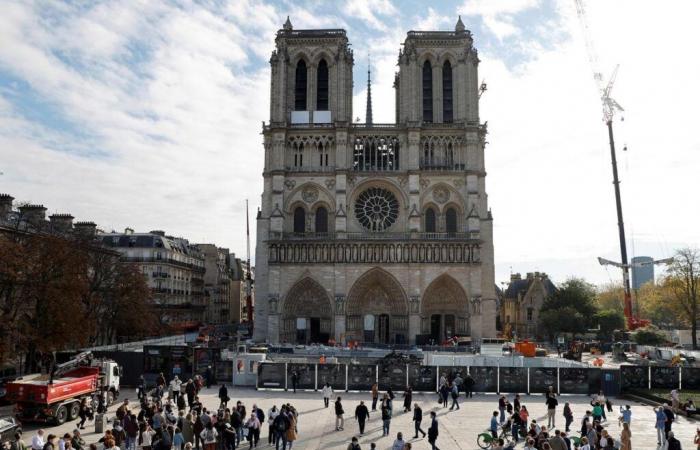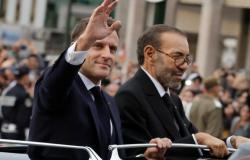
It is October 25. Only a month left before the reopening, on December 7, of the church ravaged in 2019 by a spectacular fire. The seriously injured person was treated. The public will find Notre-Dame. But something could soon change in its relationship with the cathedral. Rachida Dati, Minister of Culture, indicated in an interview with “Figaro” that she would like the establishment of a “symbolic” price (5 euros) for tourist visits, excluding masses and offices.
40,000 visitors per day
The cathedral attracts around 40,000 visitors per day, 75 million euros per year could thus be collected. This windfall would be directed towards “a major plan to safeguard religious heritage” and would make it possible to “save the churches of France” – 5,000 of them are considered to be in very poor condition. Remember that, since the law of 1905, churches built before that date, the vast majority, are the responsibility of the municipalities. As for the cathedrals, it is the State which owns them.
In front of Notre-Dame, Rachida Dati's proposal arouses more reservations than support. “It’s much more than a church. It is a monument that is part of our common history. Something doesn't please me about the idea of paying for entry,” notes Isabelle Laplace, a salesperson in Vendée, “more of a believer but not a practitioner,” who likes to stroll through churches “for the heritage but also to feel to recharge, to collect oneself.” “If we set up a ticket office, it’s no longer the same spirit,” she believes. We are entering into a more mercantile approach. »
Aurélie Bleuton, professor in Saône-et-Loire, judges that “the maintenance of important heritage sites should rather be the responsibility of major patrons”. “Five euros is not a huge amount,” she said, “but if you add 13 euros for the Sainte-Chapelle, between 15 and 20 euros for each major museum… Notre-Dame is one of the few places still free in a capital where everything is more and more expensive. » When asked if they would welcome such a development, Charlie and his wife, two German retirees, offered a definitive “nein”: “A question of principle: a church should not charge money”, according to these two practicing Christians.
“I know, having observed it at home in Normandy, that the maintenance of religious buildings weighs heavily on the community budget. But I also think that people should be able to access a place of worship for free,” explains a physics aggregation student. Fredy, a 20-year-old Peruvian, agrees: “It is normal that tourists contribute to the maintenance of an exceptional site. »
Veto du diocese
In the political field, the idea, already defended a few years ago by Stéphane Bern, received the immediate support of the Minister of the Interior Bruno Retailleau, the president of the Île-de-France Region Valérie Pécresse, and even by Laurent Lafon (Centrist Union), president of the Senate Culture Committee, who wants the reflection to be extended to other cathedrals among the 87 in the country, “like Reims, Chartres”.
On the other hand, the diocese of Paris reaffirmed its frank opposition, emphasizing that the mission of the Catholic Church is to “unconditionally welcome every man and woman” and that “at Notre-Dame, pilgrims and visitors do not have never been distinguished. Services are celebrated during visitation, and visitation continues during services.”
The diocese also invokes the law of 1905, article 17 of which specifies: “The visit to the buildings must be public” and “not give rise to any tax or fee”. The diocese is certainly not the owner, but it is the owner of the cathedral. Its veto is therefore anything but secondary.
The Italian example
“Without the agreement of the clergy, such an idea cannot succeed,” said, joined by “Sud Ouest”, the communist senator Pierre Ouzoulias, co-rapporteur of a senatorial mission on the state of religious heritage. He sees in Rachida Dati’s proposal “a communication operation that is difficult to apply”. “We would have to modify the law of 1905, go into a standoff with the episcopate, organize a ticket office, recruit agents, erect barriers in the nave of Notre-Dame to separate tourists from believers…”
Rachida Dati underlines that “everywhere in Europe, access to the most remarkable religious buildings requires payment”. For example in Italy, in Spain. Pierre Ouzoulias qualifies: “In Italy, what is often not free is access to certain exceptional parts such as crypts, cloisters, “Treasures”… Moreover, at Notre-Dame, both tours are already paid for. »
According to him, the number one issue in the maintenance of religious heritage is not necessarily money but “a lack of cultural engineering”: “Town halls, particularly in rural areas, where many churches are falling into ruin. , have too little time and staff to set up restoration projects, seek funding, find architects… We must support them in these procedures. »
At the beginning of October, Rachida Dati announced her intention to have the Eiffel Tower classified as a historic monument. At the end of October, a new much-discussed declaration, this time on the cathedral. “The minister is in the campaign…” judges a left-wing elected official, recalling the municipal ambitions in the capital of the woman who is also the mayor of the VIIe arrondissement.





